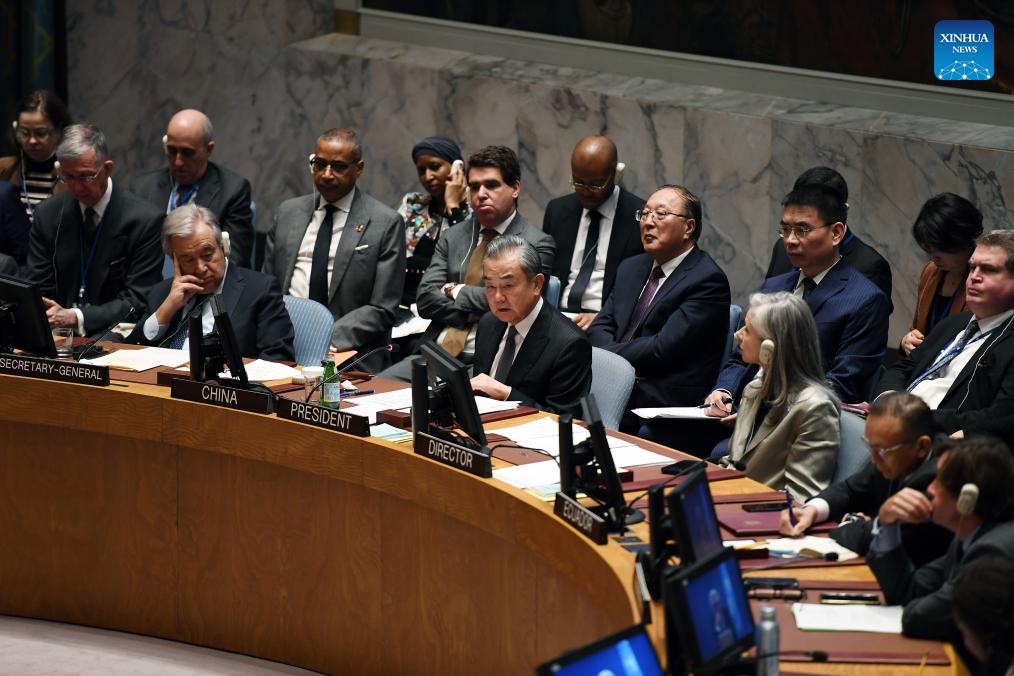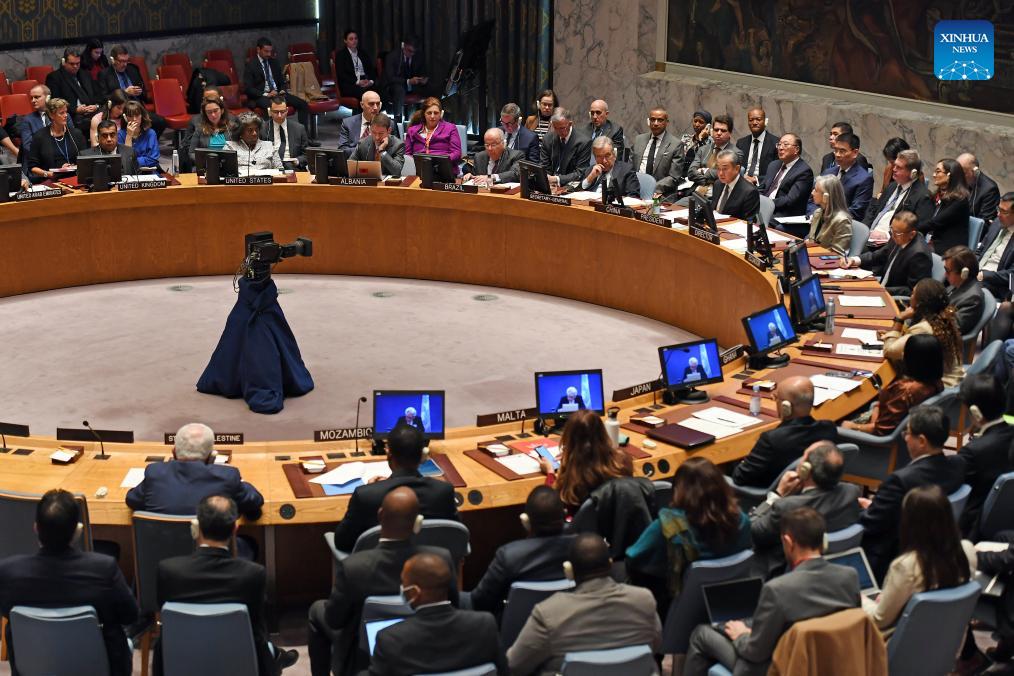
As the rotating president of the United Nations Security Council for November, China holds a Security Council high-level meeting on the Palestinian-Israeli issue here on Nov. 29, 2023. Chinese Foreign Minister Wang Yi, also a member of the Political Bureau of the Communist Party of China Central Committee, chairs the meeting. Foreign ministers and high-level representatives from nearly 20 countries, including Brazil, Palestine, Qatar, Jordan, Saudi Arabia, Egypt, Indonesia, Türkiye, Slovenia, and Malaysia, as well as all members of the Security Council, attended the meeting. UN Secretary-General Antonio Guterres and the UN Special Coordinator for the Middle East Peace Process Tor Wennesland briefed the meeting on the situation. [Photo by Li Rui/Xinhua]
UNITED NATIONS, Nov. 30 (Xinhua) -- Dialogue and negotiation are the best options for saving lives and the fundamental way to resolve conflicts, Chinese Foreign Minister Wang Yi said here Wednesday.
As the rotating president of the UN Security Council for November, China on Wednesday held a Security Council high-level meeting on the Palestinian-Israeli issue. Wang, also a member of the Political Bureau of the Communist Party of China Central Committee, chaired the meeting.
Foreign ministers and high-level representatives from nearly 20 countries, including Brazil, Palestine, Qatar, Jordan, Saudi Arabia, Egypt, Indonesia, Türkiye, Slovenia, and Malaysia, as well as all members of the Security Council, attended the meeting. UN Secretary-General Antonio Guterres and the UN Special Coordinator for the Middle East Peace Process Tor Wennesland briefed the meeting on the situation.
Wang said that since the outbreak of the ongoing Palestinian-Israeli conflict, China has been working for peace and striving to save lives.
He said that Chinese President Xi Jinping has repeatedly expounded on China's principled position on the current Palestinian-Israeli conflict, calling for an immediate ceasefire to prevent the expansion of the conflict, ensuring the safety and smooth flow of humanitarian aid, and emphasizing that the fundamental solution lies in implementing the two-state solution and promoting a comprehensive, just, and lasting resolution to the Palestinian question.
As the rotating president of the Security Council for the month, China has always prioritized the Palestinian-Israeli conflict, Wang said.
The Security Council passed Resolution 2712 this month, initiating steps to promote a ceasefire, he said, noting that the current conflict has claimed a large number of innocent lives and caused an unprecedented humanitarian disaster, with its spillover effects continuing to emerge.
Noting that war tests conscience and justice, and peace calls for reason and wisdom, Wang said that the international community must take more actions to save lives and restore peace.
He called for promoting a comprehensive and lasting ceasefire with the greatest sense of urgency. There are no safe zones under fire, and the Gaza Strip has no firewall, Wang said.
China strongly hopes that the temporary ceasefire is not just an interlude before a new round of offensives, but the beginning of a further comprehensive and lasting ceasefire, Wang said.
A comprehensive and lasting ceasefire should be the overriding priority, and all parties should focus all their efforts on the common goal of quelling the Gaza conflict, he said, noting that more practical and effective actions should be taken to protect civilians.
Any violence and attacks against civilians are unacceptable, and any actions violating international humanitarian law should be condemned, Wang said.
China reiterates its opposition to collective punishment against the people of Gaza, to forced displacement of Palestinian civilians, and that all detained individuals should be released, he said.
Wang said that the full implementation of Security Council Resolution 2712 is necessary to clear the obstacles for the entry of adequate humanitarian supplies and to open more rescue channels to Gaza.
The United Nations should play a greater role in supervising and coordinating humanitarian actions in Gaza, he said, adding that the Chinese government will provide a new batch of emergency humanitarian aid to the area.
Wang said that it is necessary to revive the political prospect of the two-state solution with greater determination.
Israel has long been an independent state, and the Jewish people are no longer displaced, but the Palestinian people's right to statehood and subsistence and their right of return have long been ignored, which is the fundamental reason why Israel and Palestine have repeatedly found them entangled in turmoil.
The Palestinian issue can only be fairly and justly solved by the two-state solution, which is irreplaceable, Wang said.
Only when the two-state solution is truly and comprehensively implemented, can peace in the Middle East be realized, can Palestine and Israel live in peace, and can the Arab and Jewish peoples have common development, Wang said.
China calls for greater international and regional diplomatic efforts to revive the political prospect of the two-state solution and restart direct negotiations between Palestine and Israel, he said.
Wang said that China proposes holding international peace conferences of a larger scale, scope and effectiveness, and supports Palestine in becoming a full member state of the United Nations.
It is necessary to push the Security Council to take responsible and meaningful actions, Wang stressed. The Security Council must demonstrate its responsibility on the major issues regarding war and peace, as well as life and death, heed the call of the Arab and Islamic countries and the international community as a whole, and take further actions in a timely manner, he added.
China has submitted Position Paper of the People's Republic of China on Resolving the Palestinian-Israeli Conflict, putting forward the working principles and priorities of the international community in five aspects -- promoting a comprehensive ceasefire, effectively protecting civilians, ensuring humanitarian relief, stepping up diplomatic mediation, and seeking a political solution through the implementation of the two-state solution, Wang continued.
He noted that China will continue to strengthen coordination with relevant parties, build consensus, and push the Security Council to shoulder its due responsibilities, fulfill its responsibilities for peace, and speak for justice.
The participating parties appreciated China's initiative to hold the high-level meeting on the Palestinian-Israeli issue, believing that the meeting, convened on the International Day of Solidarity with the Palestinian People, was of great significance for promoting the ceasefire and alleviating the humanitarian crisis, and will help pool wisdom, build consensus and form synergy.
Participants of the meeting generally supported the extension of the temporary truce until a permanent ceasefire is achieved, and called for the release of captives, the protection of civilians, the expansion of humanitarian assistance, and the smooth access to supplies.
It is hoped that the Security Council will earnestly fulfill its duty of maintaining international peace and security, play a greater role in easing tensions, restart the peace process at an early date, and ultimately realize the peaceful coexistence between Palestine and Israel.
On the sidelines of the meeting, Wang met separately with UN Secretary-General Antonio Guterres, Deputy Prime Minister and Foreign Minister of Slovenia Tanja Fajon, Brazilian Foreign Minister Mauro Vieira, and Malaysian Foreign Minister Zambry Abdul Kadir.
He also met collectively with foreign ministers of Saudi Arabia, Egypt, Qatar, Türkiye, Indonesia and other Arab and Islamic countries.

As the rotating president of the United Nations Security Council for November, China holds a Security Council high-level meeting on the Palestinian-Israeli issue here on Nov. 29, 2023. Chinese Foreign Minister Wang Yi, also a member of the Political Bureau of the Communist Party of China Central Committee, chairs the meeting. Foreign ministers and high-level representatives from nearly 20 countries, including Brazil, Palestine, Qatar, Jordan, Saudi Arabia, Egypt, Indonesia, Türkiye, Slovenia, and Malaysia, as well as all members of the Security Council, attended the meeting. UN Secretary-General Antonio Guterres and the UN Special Coordinator for the Middle East Peace Process Tor Wennesland briefed the meeting on the situation. [Photo by Li Rui/Xinhua]

 中文
中文



